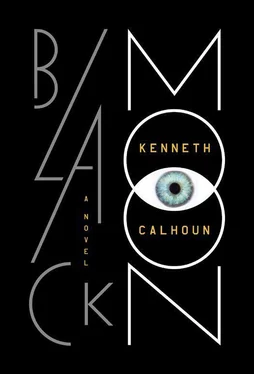Where is he now? she wondered, as the sparrows in the coral trees began their dawn chorus. Last she heard from him was a voice message from Idaho. He was on his way up to Montana with Jordan, their friend from high school, insisting that she see him on her birthday, back at her parents’ house. She had agreed, but wondered if she should have. Maybe it was best to make a clean break. Or maybe he was changing, as he said. These are the kinds of things she used to worry about. That was only a week or so before the insomnia story became the only story, before she learned that her dad hadn’t been sleeping. Before survival became everyone’s occupation.
She stood at the railing and looked down the bluff at the rocky beach below. Her eyes scanned the water’s edge and she realized she was looking for the body of an administrator—a Swede named Annika—who had thrown herself over the edge a week earlier. A refugee from the main campus, she had become increasingly distressed at being away from her homeland as the crisis escalated. As sleeplessness overwhelmed her, she began insisting that she was being held in America against her will. Her leap, Felicia assumed, was her idea of an escape.
The body had been spotted on the rocks far below. Kitov had sent out members of the security team to retrieve it. But somehow, between sealing the corpse in a body bag and returning to the center, they had lost it. Their rambling and conflicting explanations could not be sorted out, and Franklin, the security chief, refused to risk sending anyone down to search for it, fearing they wouldn’t be capable of finding their way back.
Felicia kept the black body bag in mind as she studied the shoreline. Would she, in her state of mind, be able to distinguish the bagged administrator from the seals sunning on the rocks? She became absorbed in scrutinizing the dark formations below.
BY the time she made it to the meeting, Kitov had already announced that he would be first to have the electrodes implanted. The procedure would take place within hours. Only a dozen people had been clearheaded enough to remember the meeting time and place. They were alternately slumped over with apathy or aggressively challenging the plan.
“Why Kitov?”
“Because the research that he is researching must be going on,” Lee explained.
Felicia winced at his delivery.
“But why take the risk of being first? Isn’t it dangerous?”
“Is not dangerous. We have planned very much,” Kitov answered.
“Why not just try it out on someone else’s brain first?” Phil, a lab tech, wanted to know. The bags under his eyes like wasp stings. “Someone more expendable why not?”
At this Kitov’s face reddened. “Who is this, this expendable someone? You would like that we just grab one of you and tie you to table and open your head?”
“Not us,” Phil said. “Someone we find. Out there.”
Kitov cast an angry glare at the tech. Only weeks ago, such a withering look would have cut like a laser through flesh and bone and triggered the tendering of resignations. Now it was met with the blank stares of people too exhausted to fear.
Porter filled the silence, saying, “There’s no time for that. Every day we wait we lose the faculty to do this kind of procedure because, in case you haven’t noticed, we’re losing our goddamn minds.”
“I am not a Mengele,” Kitov finally said, reminding everyone present that he had seen the end of the world before—that everything he knew as home had been burned to the ground when he was a boy, or stood against a wall and shot. Yet here he was, attempting to stare down yet another Armageddon.

TO gear up for the procedure, they had been looting equipment from the university’s abandoned hospital, cobbling together an operating room in the main lab of the research facility. They were concerned about electricity, even though all the research facilities were powered by an experimental system that tapped wave movement and riptides. The turbines, which sat just under the surface among the kelp beds, were revealed every day by the receding tide. The elegant electromagnetic system had earned its inventor a Nobel Prize, even though it had never been adopted as a viable alternative energy solution anywhere beyond the research wing of the campus. Kitov had very publicly despised the late Frenchman who created the wave-powered plant and had abused his famous colleague at every opportunity. Now, as they shaved the back of his head, he joked that the plant would fail during the procedure. “This bastard Cloutier will have last laugh,” he grumbled, his words slurred.
They enclosed Kitov’s large head inside a metal frame, locking it into position with pins that bored into his skull. Felicia, who had mastered the use of a syringe when injecting countless rats and dogs for Lee’s research, was recruited to administer the local anesthetic at the four points where the pins penetrated the scientist’s papery skin. He winced when the needle went in, telling her that she was queen bee, who, unlike the drones, can sting repeatedly with no fear of death. The moment had summoned enough adrenaline to override her exhaustion and steady her hand. She numbed the top of his head too, at the drill points, then stood back. There would be no more anesthesia, local or general, since the brain itself does not feel pain.
Lee and Porter moved in, locking the electrode driver onto the frame. The driver would ease in the electrodes with the precision and steadiness of a machine. Normally, its movements would be largely automated—informed by calculations made from computer analysis of MRI and tomography scans. But no one remaining at the center knew how to get the driver and the computer to talk to each other, not in real time, so the task fell upon Lee, whose machinelike comportment seemed a good fit. For guidance, he would listen to the firing of nerve cells, which were picked up by the electrode and amplified. He would also ask Kitov to count, or list animals, or raise his arms, in order to determine the location of the implant as it traveled to its destination.
There was some blood when they drilled, even though they had flapped the scalp. Felicia was ready with gauze, quickly sponging off the area. The drill’s high-pitched whine filled the room. A wisp rose from the contact point and Felicia couldn’t tell whether it was mist from the liquid coolant the drill expelled or bone dust. Before long, there were two nickel-sized pieces of skull in the tray and two openings, like a peephole for each eye, in Kitov’s skull. They could all see his brain under the lights—a slick, pale coil of fat worms, thinly stained red.
“And so,” Kitov asked sportingly, “what do you see? My childhood is there? My Vera there on bench by river? See how we found so many mushrooms? I hurt my shoulder falling on the ice in front of the institute.”
“It’s your head,” Porter said, “not a View-Master.”
Lee, from behind his surgical mask, glanced at Porter, then Felicia. Was Kitov delirious from lack of sleep or just giddily rhapsodic over clearing the first hurdle? he seemed to ask with his raised eyebrows, with his questioning pause.
They did not answer. Instead, Porter asked Kitov if he was comfortable. The older man laughed. “My face has before been trapped in tighter places! But, yes, soft places.”
Lee sat and studied the driver monitor. With a small joystick, he lowered the recorder electrode lead so that it sat only millimeters above the brain tissue. Then, with a nod to Porter, he edged the joystick forward and the thin, stiff tendril of wire slid slowly between the wet convolutions with a faint electric hum. He paused.
“All good?” he asked his patient.
Читать дальше













